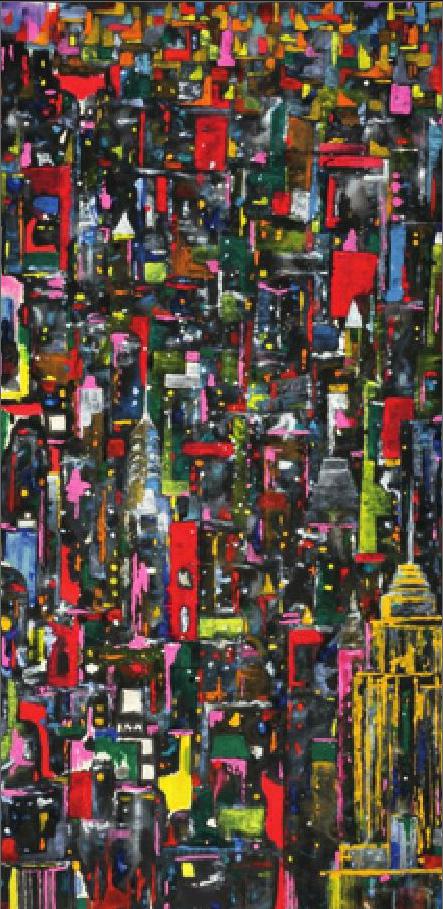Poetic Devices
2014-10-11

Swathes of withered lotuses stand silently in a pond, their leaves and flowers long wilted away. Having weathered storms, wind and frost year after year, they seem weak and detached, caring naught about the prosperity of those colorful flowers in bloom around them.
This natural vicissitude is a picture of beauty, the same sort visualized in The Peak of Poetic Perfection, an ink wash painting by Yan Zhen, one of the most promising poets in the early years of the founding of the Peoples Republic of China (PRC).
Yan Zhen was born Yan Guiqing in 1930 in Laiyang, east Chinas Shandong Province, and his childhood memories there would later come to have a profound influence on his art. Now 84 years old, the painter and poet often thinks of the nights he spent with his father on a kang, a traditional brick platform used for sleeping in north China, chanting poetry from the Tang Dynasty (618-907) while snowflakes flew in the chilly wind outside.
Yan has long held a penchant for writing his own poems, ever since taking part in the Communist Party of China-led revolution, which culminated in the founding of the PRC in 1949, when Yan was 15. However, it was not until his 1985 visit to the United States as a member of a Chinese delegation that Yan decided to dabble in the realm of painting.
“At that time, I tried to express my appreciation for the hosts hospitality with a poem. Yet the interpreter was not sophisticated enough to really convey my message to the American people,” said Yan, who then vowed to present them with a more internationally comprehendible show of his talents during his next visit to the United States. In 2008, he fulfilled that wish by taking his art exhibition there.
Yans paintings are always accompanied by poems, in order to fully convey the artistic concept he hopes to present. “Poetry is restrained by words, while painting is capable of expressing a feeling or a state of mind that goes beyond languages,” said Yan.
After leaving Laiyang and joining the revolutionary cause, Yan settled down in Anhui Province. In his painting A Dreamless Night, set in Huizhou, hundreds of gray houses and windows can be seen; above the cluster of roofs, there is a small, bright crescent. Yans strong attachment to the city, his second hometown, and its history can be felt.
In ancient times, tea merchants from Anhui would travel over mountains and across vast expanses to do business throughout the nation, leaving their wives and children at home. During those silent and lonely nights, the families left behind could be reunited with their husbands and fathers only in dreams.
“Looking at the moonlight cast over all these windows, one can sense that melancholy feeling. But only the people living under these roofs know their own sad stories,” Yan said.
At the invitation of the UN General Assembly, an exhibition of Yans poems and paintings titled China in Ink is set to open on September 15 during the 69th session of the General Assembly at the UN headquarters in New York City. The exhibit itself was sponsored by the New York-based Global Sustainable Development Foundation.
At the solo exhibition, a total of 18 recent ink wash paintings will be on display. It is hoped that these special forms of Chinese culture will attract extensive attention from visitors the world over, invoking strong reactions with their vibrant colors and universality.
In Yans eyes, ink wash painting is not just a tool through which to present audiences with objective images, but also a fusion of Chinese elements: Ink is the life, and water is the soul.Since a painter can integrate parts of his own life and soul into his work, Chinese ink wash paintings are infinite in variety.
Throughout Yans life and all his poems and paintings, the idea of “creating something out of nothing” has never receded.“Only in this way can a person sustain his or her life,” Yan believes.
“These days, people tend to associate a satisfied state of mind with material things like houses and cars. And most of them end up falling short of obtaining these goals, or otherwise devoting their entire lives to paying off debt. All the while, they have never really possessed anything,” said Yan.
According to him, a person can reach contentment with some basic material goods and a single mental state—constantly perfecting himself or herself. “Self-shaping is a process of overcoming and restraining oneself,” Yan said.
“Of course, freedom is the most important ingredient in life. Yet real freedom comes from restraint, not indulgence.”
In a world full of beauty waiting to be discovered—like the pathos of Yans swaying, withered lotuses at the back of the pond, past their prime but still standing—appreciating such artistry when it is found is key.
